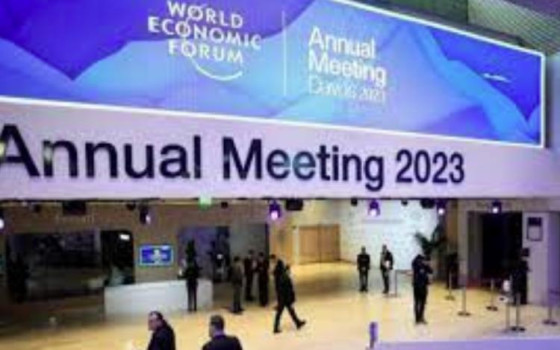
Davos Forum: Reaching a draft agreement on facilitating investment for development

- Europe and Arabs
- Friday , 20 January 2023 15:41 PM GMT
Representatives from more than 110 economies reached, today, Friday, during the activities of the last day of the World Economic Forum in the Swiss city of "Davos", a draft agreement on facilitating investment for development in the World Trade Organization.
According to a statement published a short while ago on the official website of the forum, this historic agreement paves the way for enhancing cooperation between the public and private sectors that can face investment challenges and increase the benefits of foreign direct investment for development. The World Economic Forum is supporting these efforts with pilot projects, technical inputs and launching negotiations in Davos since the January 2020 edition.
The statement stated that foreign direct investment (FDI) can play an important role in implementing the 2030 Agenda for Sustainable Development; Where investment flows help advance the development of the country by bringing in capital, employment, export opportunities, increasing consumer choices, advanced technologies, management expertise, and general economic growth.
He added that since 2017, 70 economies have started a process in the World Trade Organization with the aim of developing a new agreement on facilitating investment for development. Three years later, the negotiations were launched during the forum's annual meeting in 2020 in Davos, with 98 economies supporting the process. But as of January 2023, more than 110 economies have reached a new draft agreement to reduce red tape and facilitate investment in all sectors of the economy.
The Forum helped advance this agenda by convening an advisory body with the International Trade Center (ITC) and the German Institute for Development and Sustainability (IDOS) that provided input from investors, investment promotion officials and experts on investment facilitation measures. The group exchanged practical insights on what is required to increase investment flows and their developmental benefits in practice. With this support and from other international organisations, business and civil society, the countries have concluded a high-quality agreement that includes several commitments, among them enhancing the transparency of laws, simplifying regulation and harmonizing economies and activating innovative tools such as supplier development programs and supplier databases to increase capacity and match capital with companies/ /according to the statement//.
And he continued: The value of investment products of a sustainable nature increased by 63%, to reach $ 5.2 trillion in 2021. However, more than 95% of this capital is still in developed markets, which indicates that more is needed to facilitate flows. sustainable capitalism to emerging markets and developing countries.
At the same time, foreign direct investment fell by 35% globally in 2020 - as Covid-related lockdowns slowed existing investment projects - before recovering in 2021. However, FDI inflows declined in the second quarter of In 2022, it increased by 31% from the first quarter due to the existing challenges in the areas of food, fuel, and financing, which highlighted the urgent need to expand investment facilitation efforts as a tool to counter these trends.
The statement confirmed that the forum is currently experimenting with facilitating sustainable investment in several countries. These projects have informed the development of the WTO agreement and demonstrated that public-private cooperation can identify and help support the implementation of measures to facilitate investment for development.
In Cambodia, the Forum, in collaboration with the Cambodia Development Board, created the first database of local suppliers with sustainability dimensions, allowing foreign companies to work with local companies that operate sustainably and help strengthen ESG capital. At the same time, the database is incentivizing other local companies to switch to sustainable operations to attract and put this money to good use. In late 2021, the country adopted a new investment law, which includes the use of smart incentives for investments linked to development goals.
In Ghana, the Forum, together with the Ghana Investment Promotion Centre, is working with investors to adopt new standards on sustainable investment. Through tax legislation, Ghana has also created a new category of Recognized Sustainable Investors or investors who adhere to the principles of responsible business conduct and sustainable investing, and these investors are then eligible to receive additional support, including shorter time frames for approvals. Responsible commercial behavior and transparency in incentives are part of the provisions of the World Trade Organization, according to what was stated at the end of the statement.
The source is the Middle East News Agency












No Comments Found